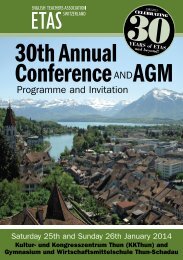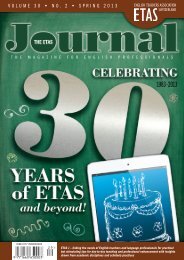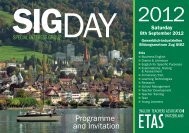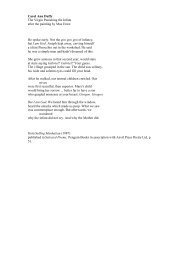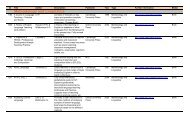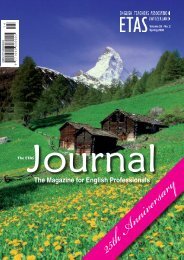Teaching English to Young Learners - English Teachers Association ...
Teaching English to Young Learners - English Teachers Association ...
Teaching English to Young Learners - English Teachers Association ...
You also want an ePaper? Increase the reach of your titles
YUMPU automatically turns print PDFs into web optimized ePapers that Google loves.
ETAS NEWS<br />
Faces of ETAS Support<br />
“Time <strong>to</strong> give something back”: A Conversation with<br />
Peter John Pasquill, Regional Coordina<strong>to</strong>r for Graubünden<br />
Ceres: Thank you very much, Peter, for<br />
gracing this issue’s Faces of ETAS Support.<br />
I’ve mentioned in our email conversation<br />
that one of the reasons we do this feature<br />
is <strong>to</strong> highlight the work of ETAS volunteer.<br />
You are currently Regional Coordina<strong>to</strong>r for<br />
Graubünden. Where did the motivation <strong>to</strong><br />
be actively involved in the <strong>Association</strong><br />
come from?<br />
Peter: I had stepped down after a decade in<br />
school management and revived my contact<br />
with ETAS as an active member. Graubünden<br />
was looking for a new Coordina<strong>to</strong>r, no one<br />
seemed willing <strong>to</strong> step in, so I did. Someone<br />
had <strong>to</strong> do it or the results of all the hard<br />
work of the past few years would have<br />
drained away. ETAS has given me a lot over<br />
the years, and it was time <strong>to</strong> give something<br />
back (again).<br />
Ceres: While the benefits of being an ETAS<br />
member are obvious, what do you see are<br />
the benefits of being an ETAS volunteer?<br />
Peter: The pleasure of helping <strong>to</strong> make good<br />
things happen, of making a contribution <strong>to</strong><br />
a worthwhile cause. So many people get<br />
lots of fun and benefit from being part of<br />
ETAS. There’s always a buzz in the air at<br />
ETAS events.<br />
Ceres: What are your goals in your term<br />
as Regional Coordina<strong>to</strong>r, and what do you<br />
envision your biggest challenge this year<br />
will be?<br />
Peter: I would like <strong>to</strong> decentralize the local<br />
branch somewhat and run workshops in<br />
different locations rather than only in Chur.<br />
This is difficult due <strong>to</strong> the complicated<br />
geography of the Can<strong>to</strong>n and the distances<br />
involved can be great. However, I feel it<br />
would be interesting and enlightening for<br />
members <strong>to</strong> see the different contexts in<br />
which our members work.<br />
Ceres: I’m sure being a Regional Coordina<strong>to</strong>r<br />
has its share of challenges, not <strong>to</strong> mention<br />
the huge investment in time. If you were <strong>to</strong><br />
do it again in the nearest future, would you?<br />
And would you encourage other members <strong>to</strong><br />
do the same, challenges notwithstanding?<br />
Peter: It all depends on one’s personal<br />
situation. I have been doing what I can,<br />
but the day job has <strong>to</strong> take priority and<br />
sometimes the demands of a full-time<br />
teaching post at a high school are <strong>to</strong>ugh.<br />
Finally, you have <strong>to</strong> limit yourself <strong>to</strong> doing<br />
just a few things but trying <strong>to</strong> do them well.<br />
Ceres: Being a member of ETAS for a<br />
long time means you have seen how the<br />
<strong>Association</strong> has changed over the years.<br />
What would you consider ETAS’s biggest<br />
contributions <strong>to</strong> ELT in Switzerland <strong>to</strong> be?<br />
Peter: ETAS has undoubtedly raised the<br />
standard of <strong>English</strong> language tuition in<br />
Switzerland and helped promote the status<br />
of <strong>English</strong> language teachers as a profession.<br />
Ceres: Here’s a curious question: how<br />
does it feel being a minority in a<br />
not-just-predominantly-women-but-women-led<br />
<strong>Association</strong>? If the opportunity presents<br />
itself, would you consider heading the<br />
<strong>Association</strong> in the nearest future?<br />
Peter: It feels just fine. ETAS has become<br />
the thriving, community-minded organisation<br />
it is precisely because it is women-led. Now<br />
there’s a sound bite! President Pasquill?<br />
The sound bite is not the signal for the start<br />
of my presidential campaign.<br />
Ceres: But going back <strong>to</strong> the beginning,<br />
how did you first get involved in <strong>English</strong><br />
Language <strong>Teaching</strong>, and where were your<br />
first jobs?<br />
Peter: As a young lad in my early twenties, I<br />
was given a job and trained by Berlitz in their<br />
direct method, which many “communicative”<br />
teachers are rather snooty about. But say<br />
what you will, it opened the classroom door<br />
for me and got me working with learners. It<br />
taught me that there really is no short cut,<br />
that learning and teaching a new language<br />
needs energy, imagination, perseverance, and<br />
dedication. And it showed me that teaching<br />
is communication. I was put in charge of a<br />
new school, but left <strong>to</strong> do a degree at the<br />
University of Zürich, from where I went in<strong>to</strong><br />
high school teaching. I joined ETAS, saw<br />
Alan Maley at a Convention, and then knew,<br />
“This is the work I want <strong>to</strong> do”. Then in<strong>to</strong><br />
management as Principal of The Bell<br />
Language School, Zürich. Now I am Head<br />
of Second Languages at an international<br />
boarding school in Zuoz, Engadine, after<br />
having led the introduction and development<br />
of the International Baccalaureate<br />
programme at the school for 12 years.<br />
Ceres: Your long professional experience<br />
means you have worked through many<br />
changing trends in <strong>English</strong> Language<br />
<strong>Teaching</strong> methodology. What are the major<br />
challenges facing EL teachers in this<br />
country? How do you see the role of the<br />
EL teacher in Switzerland evolving over the<br />
next 5 – 10 years?<br />
Peter: The fundamental challenge is<br />
unchanging: finding the connection <strong>to</strong> each<br />
learner and then helping them find the right<br />
path <strong>to</strong> their goal. It is hard <strong>to</strong> say what the<br />
Switzerland-specific challenge is. Perhaps it<br />
is still the issue of decent pay for what is a<br />
valuable service. Sadly, the market is against<br />
us. Basic training can be completed in a few<br />
weeks, which means that there are lots of<br />
people looking for jobs and most cus<strong>to</strong>mers<br />
in language schools are willing <strong>to</strong> pay only<br />
moderate fees for a steadily-improving,<br />
high-quality service. There is a scramble on<br />
for even better qualifications <strong>to</strong> give one the<br />
edge over rival applicants. It is also important<br />
<strong>to</strong> try <strong>to</strong> keep one’s feet on the ground when<br />
faced with the temptations of hi-tech course<br />
materials or Weapons of Mass Distraction!<br />
Ceres: What are your plans for continuing<br />
your professional growth? In particular,<br />
what aspects of your teaching are you<br />
most interested in developing?<br />
Peter: As teachers, I think there are three<br />
things we should always be working on:<br />
our sense of personal well-being, being fully<br />
aware of what precisely we are trying <strong>to</strong><br />
achieve, and our choice of possible responses<br />
<strong>to</strong> what is happening in the classroom.<br />
Methodology, planning, choice of activities,<br />
materials follow. But I don’t always get my<br />
priorities right.<br />
Ceres: Many of us have been lucky <strong>to</strong><br />
have men<strong>to</strong>rs who have played profoundly<br />
influential roles in our professional<br />
development. Which writer or scholar has<br />
had the most influence over the way you<br />
understand learning and teaching?<br />
Peter: Without a doubt there are two: Alan<br />
Maley and Adrian Underhill, as teachers and<br />
as writers.<br />
Ceres: Thank you very much, Peter, for<br />
giving ETAS J so much of your time.<br />
Especially, thank you so much for giving<br />
ETAS a part of yourself.<br />
Peter: Thank you for the challenging<br />
questions. I hope the interview is of some<br />
interest <strong>to</strong> our readers.<br />
Ceres Pioquin<strong>to</strong><br />
ETAS Journal 28/3 Summer 2011 11



